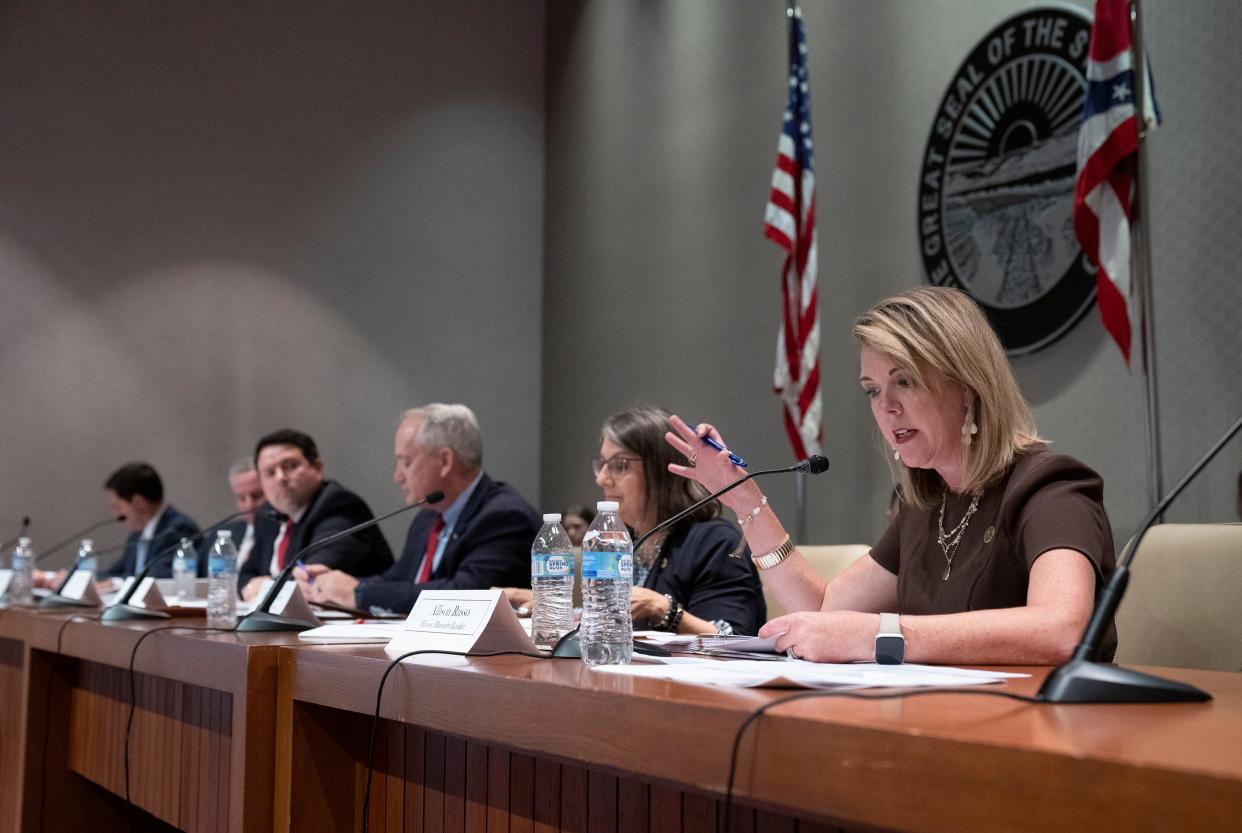Ohio Politics Explained podcast: Supreme Court hears abortion case, maps get approved

- Oops!Something went wrong.Please try again later.
Ohio got a new set of maps for its state House and Senate districts this week. The state Supreme Court heard arguments for and against a six-week abortion ban, and the state moved forward on a legal change to help those sexually abused by Boy Scout leaders.
We break down what it all means in this week's episode of Ohio Politics Explained.
A podcast from the USA TODAY Network Ohio Bureau that catches you up on the state's political news in 15 minutes or less. This week, host Anna Staver was joined by reporter Laura Bischoff.
Bipartisan maps?
Ohio Republicans and Democrats unanimously agreed late Tuesday on new district maps for the state House and Senate that will last through the 2030 elections.
Republicans will get a 61-38 advantage in the House and a 23-10 advantage in the Senate. That's more than the partisan breakdown of the state−a reason why the Ohio Supreme Court rejected multiple maps.
"At the end of the day, we are not achieving what I believe the voters of Ohio wanted us to achieve," House Minority Leader Allison Russo, D-Upper Arlington, said.
She and Senate Minority Leader Nickie Antonio, D-Lakewood, told reporters they voted for the maps because it was the best possible deal but that lawmakers should be removed from this process.
A group called Citizens not Politicians hopes to convince voters they should replace the seven-member Ohio Redistricting Commission with a panel of citizens in 2024.
Court debates abortion ban
Ohio's law banning almost all abortions after six weeks gestation has been on hold since September 2022. A Hamilton County judge pressed pause on the law after several abortion clinics sued, ruling that "abortion is health care to which Ohioans have a right."
This week, Ohio's State Supreme Court didn't hear arguments on the merits of a state right to abortion. Instead, both sides argued that the other had no right to be there.
The clinics said Attorney General Dave Yost didn't have a right to appeal the case because the Hamilton County judge hadn't issued a final judgment, a necessary first step in any appeals process. The First District Court of Appeals agreed and ruled that Yost skipped steps.
Yost's team said the abortion clinics lacked standing, the legal right to sue on behalf of their patients. And that women who wouldn't want their names associated with such a case have been able to sue under pseudonyms like Jane Roe for decades.
Property taxes on the rise
Homeowners across Ohio are bracing for potentially big property tax bills in 2024 after the state saw historic increases in home values this year.
Value increases and tax increases are not one-to-one, but Ohio's complicated system of local levies, abatements and exemptions definitely produces winners and losers.
That's why lawmakers from both sides of the aisle are pitching bills to change what homeowners might pay in 2024 and beyond.
One idea would limit tax increases for those earning less than their county's median income, another would give homeowners older than 70 a break, and a third would change how home values get calculated.
Relief for abuse victims
Ever since the Boy Scouts of America settled with former members who were sexually abused by leaders, Ohio's survivors have been asking state lawmakers to help them collect the total amount they're owed.
The state's current statute of limitations for child sex abuse in bankruptcy cases would limit their awards to a fraction of what survivors in other states receive.
But House Bill 35, which unanimously passed the Senate Wednesday, would scrap the civil statute of limitations. The law would sunset after five years and only apply to organizations with a congressional charter, a federal recognition the Boy Scouts received in 1916.
Members of Ohio's GOP majority have balked at broader legislation that would change the statute of limitations for all child abuse victims.
Listen to "Ohio Politics Explained" on Spotify, Apple, Google Podcasts and TuneIn Radio. The episode is also available by clicking the link in this article.
The USA TODAY Network Ohio Bureau serves The Columbus Dispatch, Cincinnati Enquirer, Akron Beacon Journal and 18 other affiliated news organizations across Ohio.
This article originally appeared on The Columbus Dispatch: Ohio Politics Explained: Supreme Court hears abortion case,
